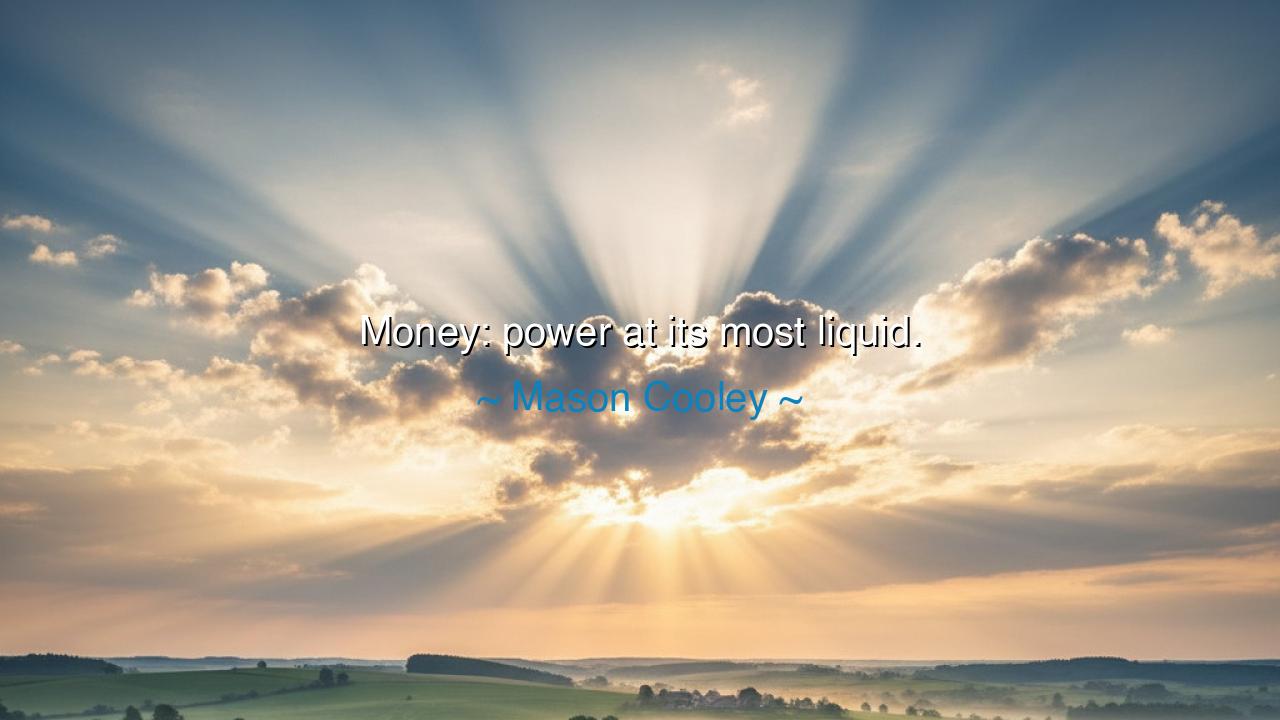
Money: power at its most liquid.






Hearken, O seekers of understanding, to the sharp insight of Mason Cooley, who revealed the essence of money as more than mere coin. He declared it power at its most liquid, a force that flows through human affairs, shaping destinies and opening doors invisible to those unversed in its subtle currents. Herein lies a timeless teaching: wealth is not merely a tool of comfort or acquisition, but a channel through which the currents of influence, authority, and change surge freely, touching every corner of mortal endeavor.
The origin of this reflection is found in the life of Mason Cooley, an observer of human behavior and the sly architect of aphorisms. In his era, he saw the world governed not only by kings or armies, but by those who wielded resources with acumen, understanding that money, like water, can nourish or drown, can cultivate growth or erode virtue. His insight distilled the truth that the liquidity of wealth is the liquidity of potential, and that those who control it shape not only commerce, but the very structures of society.
The meaning of this aphorism resonates beyond the marketplace. To hold money is to hold mobility and influence; it is to possess a force that flows where laws, armies, and treaties sometimes falter. It is fluid, adaptable, and immediate in its effect, unlike static power tied to land or title. In Cooley’s vision, wealth is not inert—it is a living instrument, capable of building empires, shaping culture, and bending the course of human affairs. To underestimate it is to misunderstand the nature of authority itself.
History provides ample testament to this truth. Consider the Medici family of Renaissance Florence, whose coffers overflowed with wealth. With their resources, they did not merely trade goods—they patronized artists, influenced popes, and steered the politics of entire city-states. Their money, liquid and nimble, became a conduit for power, demonstrating Cooley’s insight that capital, when skillfully wielded, is as potent as armies or decrees.
Yet let this teaching not render wealth a mere idol. The aphorism also warns that liquid power flows according to the character of its holder. In unworthy hands, it corrupts; in virtuous hands, it enlightens. The fluidity of money mirrors the heart of the human who commands it: it can uplift or destroy, liberate or bind, depending upon the wisdom of its steward. Thus, understanding money is inseparable from understanding the human condition itself.
O generations yet unborn, heed Cooley’s counsel: money is more than metal or paper—it is power made supple, a force that flows where intention, strategy, and vision direct it. To master its currents is to participate in the shaping of destinies, both personal and collective. And to ignore its sway is to surrender, unknowingly, to the currents of others, carried along by a river whose depth and velocity few fully perceive.






HTHong Tran
I find myself considering the metaphorical depth of 'liquid power.' Does liquidity imply adaptability, speed, and transferability in influence? I’d like to explore whether this comparison extends to investments, philanthropy, or entrepreneurship as forms of converting money into actionable power. Could understanding money in this way change how we approach economic policy, personal finance, and societal structures that reward wealth disproportionately?
THNguyen Duc Tuan Hung
This statement prompts reflection on personal agency and freedom. Could having money provide a form of autonomy and control unavailable through other means? I’m curious whether Cooley sees money primarily as a tool, a measure of influence, or a force that shapes social dynamics. How might the liquidity of wealth impact decision-making, both for individuals and institutions, and does it inevitably create ethical dilemmas about the pursuit and use of financial power?
CMnguyen cong minh
Reading this, I question the broader societal implications. If money is the most fluid form of power, how does this affect social inequality and access to opportunity? I’d like to examine whether this perspective explains why economic disparities often translate into political and cultural influence. Does the liquidity of money inherently amplify systemic inequities, and if so, what strategies might exist to balance its power within a fairer society?
HNhung nguyen
I’m intrigued by the metaphor of money as liquid power. Does this suggest that financial resources flow easily into opportunities and control, unlike static forms of influence such as status or titles? I’d like to explore whether this framing encourages ethical reflection on the use of wealth. Can recognizing money as a form of power motivate responsible action, or does it risk fostering greed and exploitation when individuals equate liquidity with absolute authority?
NHnguyen ngoc han
This quote makes me reflect on the immediacy and flexibility that money provides in exerting influence. Does Cooley imply that financial resources are the most direct form of power because they can be converted into tangible actions quickly? I wonder whether this perspective undervalues other forms of power, like social capital or knowledge. How do we balance the recognition of money’s influence with the understanding that true authority often involves more than liquidity?